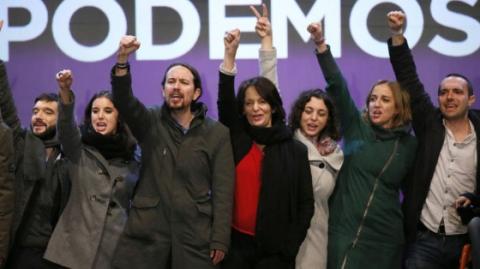When the meeting ended around 10 p.m. Friday, one of Unidos Podemos’ advisers in Madrid’s City Hall took back the mic and signaled for everyone to remain still: “They tell us that some members of the People’s Party have called the police to come here to denounce us because this may have been an illegal meeting, without permits.” A few people laughed. It was a clumsy attempt to discredit the rally. The man with the microphone shook his head and continued. “In fact, we do have permission, and we answer those ridiculous accusations like we always do: with a smile.” Applause.
This was one of the many meetings organized by Unidos Podemos in the final days leading up to Sunday’s election, in which Podemos seemed on pace to upset the socialist PSOE with a second-place finish but appear to have failed, finishing in third but stripping the People’s Party of a majority. The Podemos events were scattered throughout the city: bike rides, concerts and, in this June heat, frozen lemonade. They were political meetings without gimmicks and marked by a popular will to wrest back “the power.”
At the ends of these events, the attendees tend not to go home; they gather closer together for a chance to speak with Unidos Podemos representatives. In some cases, chairs are placed in a semi-circle where future deputies, members of European Parliament and city councillors talk directly with votes. The questions are often precise and require sincere, unambiguous answers: This is not a TV studio.
The events highlight certain aspects of this political party that is often lumped in with “post ideological” or, worse, “populist” groups. But it’s not like that: The Podemos electoral campaign was about a world that’s much more complex and difficult to label and, maybe, it supplies a few fundamental and necessary elements in order to understand the phenomenon. And maybe that’s also why this campaign was less electrifying than the one leading up to the Dec. 20 vote. For those elections, the party’s creative committee pulled all stops to convey the full force of the party’s pre-electoral journey.
As Sunday’s results indicate, it’s difficult to conjure the same freshness six months later. But Podemos has tightly maintained its character.
First of all we must highlight these leaders’ extraordinary skills. The meeting at the Aluche Park, the one PP called illegal, as well as the other initiatives distributed throughout the city, were attended by the party’s “second ranks.” The attendees were Lola Sanchez, one of Podemos European Parliament members, a few city councillors from Madrid, and Marina Albiol, Izquierda Unida’s European spokeswoman. The feeling was that this political force might fail to obtain the maximum result in this electoral campaign, but it might also give assurances about the party’s depth, building some antibodies into the Spanish political system to stave off future tragedy.
As such, the examples set by the administration in Madrid and Barcelona are helpful, especially in the debate against the party considered by Unidos Podemos as its main adversary, the People’s Party. “Scum” is a recurring term for PP and Ciudadanos, and its a demonstration of how Unidas Podemos never mentions PSOE, to which, in fact, it has always offered alliance.
But it’s the speakers’ language that shows us the strength of this party. They talk about “homeland” to refer to the “people,” in direct opposition to those who use the term “homeland” to deprive certain citizens of their rights. They talk about “order,” in this case a reference to Laclau. There’s talk about “class” and about “capital,” because these people standing in front of their voters are on a fulminating path: They all come from left-wing parties. They use strong expressions against the TTIP and against austerity, against the agreement between Europe and Turkey (“they want to turn it into a refugee prison”), against the multinationals and against the anti-immigration policies (“we will close the CIE” is one and it’s exactly where the meeting is held, or “we want everyone to be considered a citizen”).
The words unify various experiences, echoing those spoken by the indignados but for another reason: because of the people listening to them. Those describing Unidos Podemos like a mob of teachers capable of waking up the desire for politics in a middle class destroyed by the crisis are mistaken. There’s a mix of everything in the meetings held by Podemos. Young people, adults, elders, boys and girls who, it seems, come from work, students and parents. The “class” composition is also a very transversal one, with a clear concentration of people who paid very dearly for the crisis afflicting Spanish society.
It wasn’t by chance that the final rally in Friday’s campaign — with all the big leaders — was carried out on Madrid’s south side and not in the center (to highlight a, by now, transnational data on the importance of the suburbs). In spite of Sunday’s results, the public is alert and focused. These are not the kind of rallies you attend to meet new friends or be entertained. Everyone is paying attention.


Spread the word